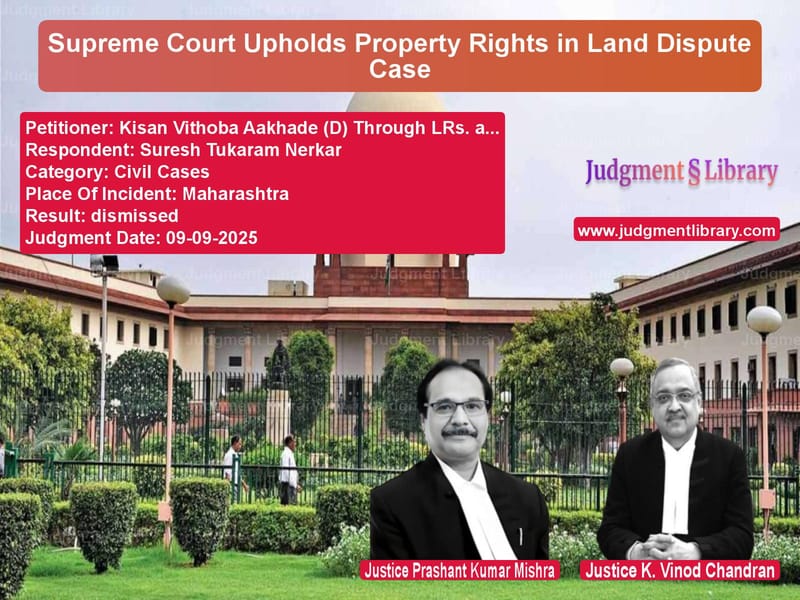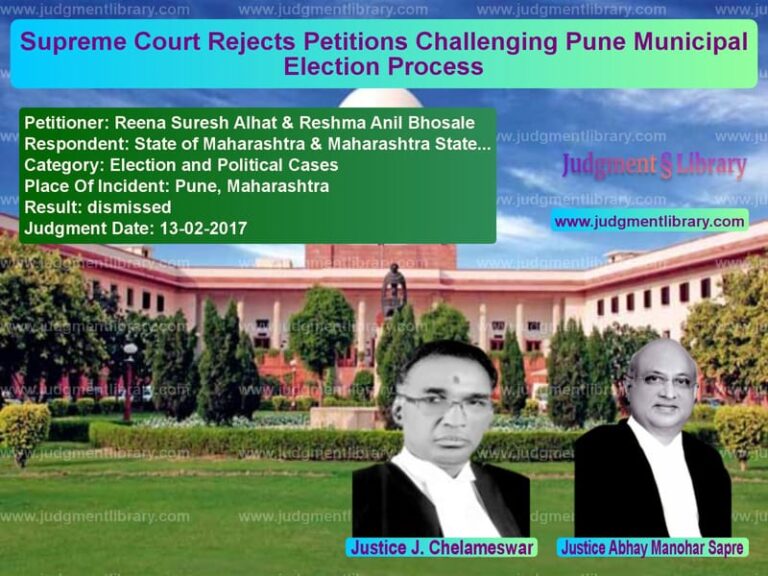Supreme Court Upholds Property Rights in Land Dispute Case
Property disputes in India often span decades, weaving complex narratives of ownership claims, boundary conflicts, and legal battles that test the very foundations of land rights. In a recent judgment that underscores the importance of proper evidence and legal procedure in property matters, the Supreme Court of India delivered a significant verdict in a case involving competing claims over a piece of land in Maharashtra. The dispute, which began as a simple suit for declaration of ownership and injunction, traveled through three levels of the judicial system, revealing crucial lessons about what constitutes valid evidence of possession and title in Indian property law.
The case pitted the legal heirs of Kisan Vithoba Aakhade against Suresh Tukaram Nerkar, with the former challenging a High Court judgment that had overturned concurrent findings from both the trial court and first appellate court. At the heart of the dispute was an open plot of land adjacent to a residential building, with both parties claiming rights over the property. The plaintiff, Suresh Tukaram Nerkar, based his claim on a sale deed that conveyed 150 square meters of property, while the defendants asserted that the actual area transferred was only 109.70 square meters and that they had been using the remaining portion as a dung heap and for waste disposal for years. What seemed like a straightforward property dispute would eventually expose fundamental principles about evidence evaluation, the distinction between temporary use and legal possession, and the proper interpretation of documentary evidence in property cases.
The Competing Arguments Before the Supreme Court
Shri Satyajit A. Desai, learned counsel for the appellants, presented a compelling case challenging the High Court’s intervention in what he argued were concurrent findings of fact. He contended that “the sale deed exhibited at Ext. 81, was produced by the plaintiff. Though it showed the extent of 150 square metres, actually as per the revenue records produced by the defendants, as on the date of sale deed the vendor of the plaintiff had possession only of 109.70 square metres.” This discrepancy in the documented area formed the cornerstone of the appellants’ argument.
The counsel further emphasized the significance of possession, arguing that “The balance portion was an open space which was in the possession of the deceased 1st appellant, the 8th defendant in the suit.” He pointed to the Commissioner’s report as crucial evidence, stating that “Despite assertion of possession by the plaintiff, in the Commission taken out by the plaintiff it was found with the 9th defendant.” This, according to the appellants, demonstrated that the plaintiff wasn’t in actual possession of the disputed property. The counsel’s most fundamental legal argument was that “there was no question of law arising in the Second Appeal and the High Court erred in reversing the concurrent finding on facts of the trial court and the first appellate court,” questioning the very jurisdiction of the High Court to interfere in the matter.
On the other side, Shri Gagan Sanghi, learned counsel for the respondent, presented the plaintiff’s perspective with equal vigor. He read the reliefs sought in the plaint, “which was a declaration of ownership and possession with consequential injunction.” The counsel clarified the context of the dispute, explaining that “The plaintiff was in possession of the entire property wherein admittedly there was a building. The disputed land was lying contiguous to the plot in which the building was constructed.”
The respondent’s counsel challenged the defendants’ claim of possession based on their use of the property, arguing that “The defendants were dumping waste in the property and keeping manure thereon, which was objected to. On objections raised there was a threat levelled and hence the suit was filed.” He made a crucial legal distinction by asserting that “The mere finding of manure and waste on the property cannot lead to a finding of possession.” Regarding the documentary evidence, the counsel contended that “The appellate court wrongly found that the title deed showed only a lower extent which was found to be a mistake of fact amounting to perversity by the High Court,” supporting the High Court’s view that the lower courts had misinterpreted the evidence.
The Supreme Court’s Critical Analysis of Evidence
The Supreme Court bench comprising Justice Prashant Kumar Mishra and Justice K. Vinod Chandran delivered a meticulously reasoned judgment that examined every aspect of the evidence and legal arguments. The Court first noted a significant procedural irregularity, observing that “the 8th defendant failed to file a written statement, and the 9th defendant alone contested the matter and adopted the objection filed to the IA praying injunction, as the 9th defendant’s written statement. Defendants 10 to 12 remained ex-parte.” This observation was crucial because it highlighted that most defendants hadn’t properly contested the suit, a fact that would influence the Court’s final decision.
The Court then addressed the core issue of title documentation, making a significant finding about the sale deed: “There was no cause for the trial court to find the title of entire ‘ABCD’ to be not established especially when there was a title deed.” This statement underscored the importance the Court placed on proper documentary evidence of title. The Court further noted that “The Commissioner has given specific measurements of the property and without a finding that the building was not constructed at least in the 109.70 square metres, the trial court ought not to have declined the relief of declaration with respect to the entire ‘ABCD’.”
On the crucial question of possession, the Court delivered perhaps its most significant observation, stating that “The Commissioner’s report only spoke of the manure kept and waste dumped in the property; which according to us cannot be a valid ground to find possession, especially when the case of the plaintiff was that waste is being thrown in the property and manure kept by the 9th defendant, without permission and despite specific objection raised against such acts.” This distinction between temporary use and legal possession would prove decisive in the case.
The Court also thoroughly examined the defendant’s claim of an oral partition, noting that “This claim was taken without any pleading or evidence regarding his relationship with the vendors family, who sold the property which devolved on him.” The judgment emphasized that “Without any evidence regarding the oral partition and without establishing the connection with such partition or relationship with the vendor or his father, who was the original owner, the 9th defendant could not have raised a valid claim of possession-in-common, of the property.” This highlighted the importance of proper evidence and legal foundation for such claims.
The Court’s Endorsement of the High Court’s Reasoning
The Supreme Court expressed strong agreement with the High Court’s approach in the second appeal, noting that “The High Court in the second appeal looked into the sale deed and found that it conveyed 150 square metres of property which was comprised in the two extents indicated separately in the map and together in the plaint description.” The Court specifically endorsed the High Court’s finding that “the mere reason of the manure and waste having been found in the property, cannot lead to a finding of possession; which finding is perverse.” The Supreme Court unequivocally stated, “We are in perfect agreement with the findings of the High Court,” giving its full endorsement to the lower appellate court’s reasoning.
On the issue of revenue records, the Court made an important observation about the timing of corrections, stating that “The revenue records produced by the plaintiff showed the corrected area as per the sale deed. Merely because the correction was done in the course of the suit is no reason to disbelieve the public record maintained.” The Court further noted that “The written submissions indicate that the application for correction was filed much before the suit was filed,” undermining the appellants’ argument that the correction was made to suit the plaintiff’s case.
The Court also addressed the first appellate court’s reliance on Section 34 of the Specific Relief Act, finding that “The first appellate court’s finding on Section 34 of the Specific Relief Act cannot be sustained since the 9th defendant did not establish possession.” This was based on the Court’s assessment of witness testimony, noting that “PW2, known to both parties, deposed that the vendor of the plaintiff used to tie his cattle in the property. It was also deposed that the 9th defendant used to keep manure and dump waste in the open plot, since the plaintiff was not residing therein.” The Court concluded that “Hence, the plaintiff’s vendor’s possession is established and the plea of his common use set up by the 9th defendant is demolished.”
The Final Verdict and Its Legal Implications
In its concluding remarks, the Supreme Court made a significant procedural observation that would ultimately determine the fate of the appeal. The Court noted that “the deceased 1st appellant, now represented by the 2nd appellant and the appellants 3 to 5 never contested the suit and they cannot file an appeal and prosecute it based on the contentions of the 9th defendant though an identity of interest is claimed by the 9th defendant.” This finding regarding the standing of the appellants was crucial to the final outcome.
Based on its comprehensive analysis of the evidence, legal arguments, and procedural history, the Court delivered its final verdict: “For all the above reasons, we find absolutely no merit in the Appeal and the same stands dismissed.” This conclusion reinforced the High Court’s judgment and ultimately upheld the plaintiff’s claim to the property.
The Supreme Court’s judgment in this case serves as an important precedent in property law, particularly regarding the evaluation of evidence in title disputes. The Court’s clear distinction between temporary use and legal possession, its emphasis on the importance of proper documentary evidence, and its strict approach to procedural requirements provide valuable guidance for lower courts handling similar disputes. The judgment also reinforces the principle that concurrent findings of fact by lower courts can be interfered with when they are based on a perverse reading of evidence, giving appellate courts the necessary authority to correct fundamental errors in the appreciation of evidence. For property owners across India, this judgment underscores the importance of maintaining proper documentation and understanding that temporary activities on a property do not necessarily establish legal possession, especially when contested by the actual owner.
Petitioner Name: Kisan Vithoba Aakhade (D) Through LRs. and Others.Respondent Name: Suresh Tukaram Nerkar.Judgment By: Justice Prashant Kumar Mishra, Justice K. Vinod Chandran.Place Of Incident: Maharashtra.Judgment Date: 09-09-2025.Result: dismissed.
Don’t miss out on the full details! Download the complete judgment in PDF format below and gain valuable insights instantly!
Download Judgment: kisan-vithoba-aakhad-vs-suresh-tukaram-nerka-supreme-court-of-india-judgment-dated-09-09-2025.pdf
Directly Download Judgment: Directly download this Judgment
See all petitions in Property Disputes
See all petitions in Specific Performance
See all petitions in Succession and Wills
See all petitions in Contract Disputes
See all petitions in Damages and Compensation
See all petitions in Judgment by Prashant Kumar Mishra
See all petitions in Judgment by K. Vinod Chandran
See all petitions in dismissed
See all petitions in supreme court of India judgments September 2025
See all petitions in 2025 judgments
See all posts in Civil Cases Category
See all allowed petitions in Civil Cases Category
See all Dismissed petitions in Civil Cases Category
See all partially allowed petitions in Civil Cases Category







